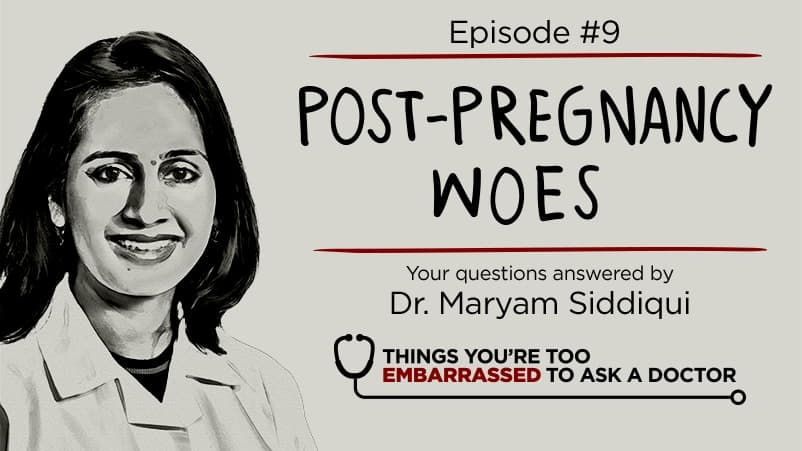Navigating body changes in the 'fourth trimester'

Before giving birth, it’s easy to underestimate what it will feel like to be sleep deprived and have a completely dependent new person in your life. The most important thing I tell women about the first three months after giving birth is to be kind to yourself. Treat yourself like you would your best friend — be encouraging and accepting of successes and failures.
What to Expect When You're Done Expecting
Here are some common concerns I hear from my pregnant patients, and suggestions for getting through the “fourth trimester”:
Why am I so physically exhausted after giving birth?
Your body went through a lot during delivery. And now it’s using energy to produce breast milk and heal any incisions. Everyone loses some blood during childbirth. This can bring on anemia, which can cause fatigue. And on top of that, your baby’s demanding schedule doesn’t allow you to get enough sleep.
What can I do to raise my energy level?
With your first baby, you can usually grab a nap during the day, but if you have other children or responsibilities, it can be harder to get the rest you need. If you’re breastfeeding, consider pumping a few weeks after giving birth so that at least one overnight feeding can be done by someone else. (Trying this too early can interfere with your milk production.) Or, your partner can use formula for one of the overnight feeds, if that’s something you’re comfortable with.
What are my chances of developing postpartum depression?
All new mothers are at risk for postpartum depression. If you have a history of depression or anxiety, the risk is higher. My colleague, UChicago Medicine psychiatrist Carolyn Shima, MD, explains that postpartum depression involves a change in the chemicals in your brain. Dr. Shima recently gave birth and was vigilant about her own risk for depression after delivery.
If you feel you may be at risk, she recommends establishing a relationship with a therapist or psychiatrist during your pregnancy. Also, she says, create a cocoon of support by helping your partner or support person understand the signs of postpartum depression. Organizations like Postpartum Support International can prepare your family and friends to better help you.
Is it normal to feel anxious about whether I’m being a good mom?
Everyone needs time to become comfortable in a new role. What seems natural also needs to be learned and perfected over time so it seems effortless. Impatience, imposter syndrome, exhaustion, a crying baby or measuring ourselves to other people can be frustrating. In addition, feelings of anxiety can also be tied to the breastfeeding experience, which can be a real struggle during the first weeks after delivery. For some families, breastfeeding doesn’t end up being the right choice – and it can be a relief to let go of that internal and external pressure.
On the other hand, if you are committed to breastfeeding, UChicago Medicine offers several resources to help you succeed. We have a weekly drop-in group called Baby Bistro, which is hosted by a lactation consultant. Certain insurance companies cover the cost of a lactation consultant to help you by phone or in your home. Some doulas also offer breastfeeding support.
I don’t have the same sex drive. Is this normal?
Yes. Women who breastfeed have lower levels of estrogen, which can decrease interest in sex and thin the tissue in the vagina, making sex uncomfortable. A topical estrogen cream can help with dryness in the vagina.
It’s also not uncommon to feel apprehensive about how sex will feel if you experienced a tear during childbirth or if you’re leaking urine during sex. These conditions usually improve with time. If you have persistent issues with holding your urine, gas or stool, then pelvic floor physical therapy can be helpful in restoring muscle strength.
How can I get my pre-pregnancy body weight and strength back?
In the weeks after having a baby, some women feel like their body is entirely defined by birth and lactation. This can feel limiting if you’re someone who has envisioned your body as a source of strength and exercise.
If you’re concerned about weight loss after pregnancy, we generally recommend losing your pregnancy weight over 12 months, so be patient. The first four to six weeks are about healing and getting used to your new normal. Gradually add in a combination of diet and exercise, but remember that dieting can impact your milk production. If you’re breastfeeding, you need up to 400 additional calories per day. Focus on rebuilding your core muscles, which help support your lower back and abdominal wall.
Remember, avoid comparisons to others when it comes to breastfeeding, weight loss or your ability to juggle work and home life. Recognize that everybody has a different journey and be wholly accepting of that.

Maryam Siddiqui, MD
A general obstetrician and gynecologist, Maryam Siddiqui, MD, provides preventative and routine care for women. She is an experienced gynecologic surgeon with expertise in vaginal surgery and sterilization techniques, in addition to the treatment of heavy menses and cervical dysplasia.
Learn more about Dr. Siddiqui
